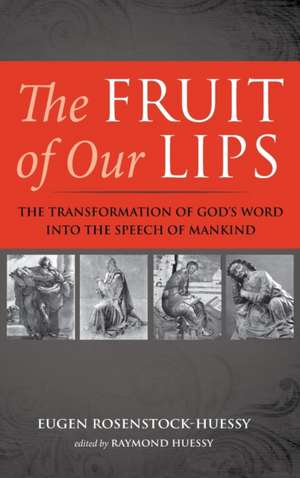The Fruit of Our Lips
Autor Eugen Rosenstock-Huessy Editat de Raymond Huessyen Limba Engleză Hardback – 31 ian 2021
Preț: 325.76 lei
Nou
Puncte Express: 489
Preț estimativ în valută:
62.34€ • 64.69$ • 52.11£
62.34€ • 64.69$ • 52.11£
Carte disponibilă
Livrare economică 24 februarie-10 martie
Preluare comenzi: 021 569.72.76
Specificații
ISBN-13: 9781725291539
ISBN-10: 1725291533
Pagini: 370
Dimensiuni: 157 x 235 x 24 mm
Greutate: 0.66 kg
Editura: Wipf and Stock
ISBN-10: 1725291533
Pagini: 370
Dimensiuni: 157 x 235 x 24 mm
Greutate: 0.66 kg
Editura: Wipf and Stock
Notă biografică
Eugen Rosenstock-Huessy (1888-1973) was a sociologist and social philosopher who, along with his close friend Franz Rosenzweig, and Ferdinand Ebner and Martin Buber, was a major exponent of speech thinking or dialogicism. The central insight of speech thinking is that speech or language is not merely, or even primarily, a descriptive act, but a responsive and creative act, which is the basis of our social existence. The greater part of Rosenstock-Huessy's work was devoted to demonstrating how speech/language, through its unpredictable fecundity, expands our powers and, through its inescapably historical forming character, also binds them. Born in Berlin, Germany into a non-observant Jewish family, he converted to Christianity in his late teens. He met and married Margrit Hüssy in 1914. Rosenstock-Huessy served as an officer in the German army during World War I. He then pursued an academic career in Germany as a specialist in medieval law, which was disrupted by the rise of Nazism. In 1933, after Adolf Hitler became Chancellor of Germany, he immigrated to the United States where he began a new academic career, initially at Harvard University and then at Dartmouth College, where he taught from 1935 to 1957.
